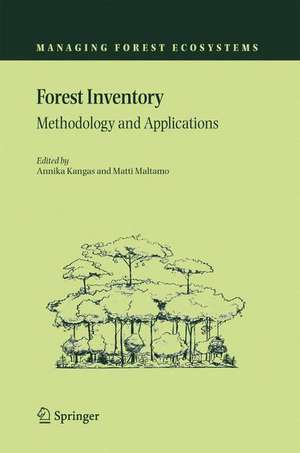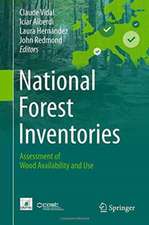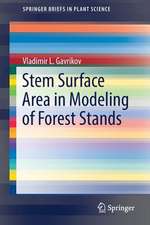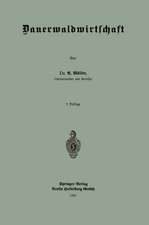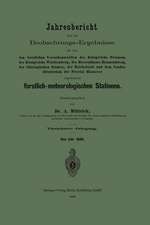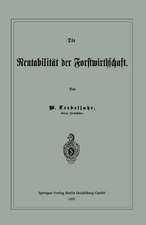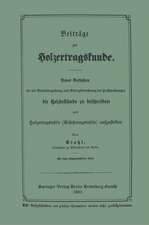Forest Inventory: Methodology and Applications: Managing Forest Ecosystems, cartea 10
Editat de Annika Kangas, Matti Maltamoen Limba Engleză Hardback – 16 ian 2006
| Toate formatele și edițiile | Preț | Express |
|---|---|---|
| Paperback (1) | 730.65 lei 6-8 săpt. | |
| SPRINGER NETHERLANDS – 10 iul 2009 | 730.65 lei 6-8 săpt. | |
| Hardback (1) | 711.21 lei 6-8 săpt. | |
| SPRINGER NETHERLANDS – 16 ian 2006 | 711.21 lei 6-8 săpt. |
Din seria Managing Forest Ecosystems
- 18%
 Preț: 945.79 lei
Preț: 945.79 lei - 18%
 Preț: 1394.03 lei
Preț: 1394.03 lei -
 Preț: 367.68 lei
Preț: 367.68 lei - 18%
 Preț: 1113.71 lei
Preț: 1113.71 lei - 15%
 Preț: 642.21 lei
Preț: 642.21 lei -
 Preț: 431.74 lei
Preț: 431.74 lei - 24%
 Preț: 1042.42 lei
Preț: 1042.42 lei - 24%
 Preț: 787.53 lei
Preț: 787.53 lei - 15%
 Preț: 646.62 lei
Preț: 646.62 lei - 15%
 Preț: 645.60 lei
Preț: 645.60 lei - 18%
 Preț: 1242.03 lei
Preț: 1242.03 lei - 15%
 Preț: 648.24 lei
Preț: 648.24 lei - 15%
 Preț: 693.90 lei
Preț: 693.90 lei - 24%
 Preț: 799.26 lei
Preț: 799.26 lei - 18%
 Preț: 1229.10 lei
Preț: 1229.10 lei - 18%
 Preț: 943.43 lei
Preț: 943.43 lei - 18%
 Preț: 948.92 lei
Preț: 948.92 lei - 24%
 Preț: 778.93 lei
Preț: 778.93 lei - 18%
 Preț: 945.62 lei
Preț: 945.62 lei - 18%
 Preț: 943.88 lei
Preț: 943.88 lei - 18%
 Preț: 1544.00 lei
Preț: 1544.00 lei - 18%
 Preț: 946.55 lei
Preț: 946.55 lei - 18%
 Preț: 1244.71 lei
Preț: 1244.71 lei - 18%
 Preț: 949.73 lei
Preț: 949.73 lei - 18%
 Preț: 967.08 lei
Preț: 967.08 lei - 24%
 Preț: 849.89 lei
Preț: 849.89 lei - 24%
 Preț: 903.00 lei
Preț: 903.00 lei - 18%
 Preț: 952.26 lei
Preț: 952.26 lei - 20%
 Preț: 592.60 lei
Preț: 592.60 lei
Preț: 711.21 lei
Preț vechi: 836.71 lei
-15% Nou
Puncte Express: 1067
Preț estimativ în valută:
136.09€ • 142.09$ • 112.63£
136.09€ • 142.09$ • 112.63£
Carte tipărită la comandă
Livrare economică 04-18 aprilie
Preluare comenzi: 021 569.72.76
Specificații
ISBN-13: 9781402043796
ISBN-10: 1402043791
Pagini: 384
Ilustrații: XX, 362 p. 8 illus. in color.
Dimensiuni: 155 x 235 x 29 mm
Greutate: 0.82 kg
Ediția:2006
Editura: SPRINGER NETHERLANDS
Colecția Springer
Seria Managing Forest Ecosystems
Locul publicării:Dordrecht, Netherlands
ISBN-10: 1402043791
Pagini: 384
Ilustrații: XX, 362 p. 8 illus. in color.
Dimensiuni: 155 x 235 x 29 mm
Greutate: 0.82 kg
Ediția:2006
Editura: SPRINGER NETHERLANDS
Colecția Springer
Seria Managing Forest Ecosystems
Locul publicării:Dordrecht, Netherlands
Public țintă
ResearchCuprins
Design-Based Sampling and Inference.- Model-Based Inference.- Mensurational Aspects.- Change Monitoring with Permanent Sample Plots.- Generalizing Sample Tree Information.- Use of Additional Information.- Sampling Rare Populations.- Inventories of Vegetation, Wild Berries and Mushrooms.- Assessment of Uncertainity in Spatially Systematic Sampling.- The Finnish National Forest Inventory.- The Finnish Multi-source National Forest Inventory - Small Area Estimationand Map Production.- Correcting Map Errors in Forest Inventory Estimates for Small Areas.- Multiphase Sampling.- Segmentation.- Inventory by Compartments.- Assessing the World's Forests.- Europe.- Asia.- North America.- Modern Data Acquisition for Forest Inventories.
Recenzii
From the reviews:
“This book achieving its aim to serve as an academic textbook and as a practical manual … . the mix of useful information and impediments in the book recommends it as textbook and brain-trainer to students at EU universities. It gives an interesting overview over the complexities, problems and impressive achievements of forest inventory in Finland and is a welcome mental fitness trainer for inquisitive, integrating, coordinating and logical thinking, which I rather enjoyed.” (Eberhard F. Bruenig, International Forestry Review, Vol. 11 (4), 2009)
“This book achieving its aim to serve as an academic textbook and as a practical manual … . the mix of useful information and impediments in the book recommends it as textbook and brain-trainer to students at EU universities. It gives an interesting overview over the complexities, problems and impressive achievements of forest inventory in Finland and is a welcome mental fitness trainer for inquisitive, integrating, coordinating and logical thinking, which I rather enjoyed.” (Eberhard F. Bruenig, International Forestry Review, Vol. 11 (4), 2009)
Textul de pe ultima copertă
This book has been developed as a forest inventory textbook for students and can also serve as a handbook for practical foresters. The book is divided into four sections. The first section deals mostly with sampling issues. First, we present the basic sampling designs at a fairly non-technical mathematical level. In addition, we present some more advanced sampling issues often needed in forest inventory. Those include for instance problems with systematic sampling, and methods for sampling vegetation or rare populations. Forest inventory also includes issues that are unique to forestry, like problems in measuring sample plots in the field, or utilising sample tree measurements. These issues include highly sophisticated methodology, but we try to present these also such that forestry students can grasp the ideas behind them. Each method is presented with examples. For foresters who need more details, references are given to more advanced scientific papers and books in the fields of statistics and biometrics.
Forest inventories in many countries involve much more than sampling and measurement issues. Most applications nowadays involve remote sensing technology of some sort, so that section II deals with the use of remote sensing material for this purpose. Examples of multi-phase and multi-source inventory are presented. Methods suitable for special applications, like stand-level or global-level inventory, are also presented. Section III deals with national inventories carried out in different parts of the world. Examples of forest inventory in selected countries around the world are presented. Section IV is an attempt to outline some future possibilities of forest inventory methodologies.
Forest inventories in many countries involve much more than sampling and measurement issues. Most applications nowadays involve remote sensing technology of some sort, so that section II deals with the use of remote sensing material for this purpose. Examples of multi-phase and multi-source inventory are presented. Methods suitable for special applications, like stand-level or global-level inventory, are also presented. Section III deals with national inventories carried out in different parts of the world. Examples of forest inventory in selected countries around the world are presented. Section IV is an attempt to outline some future possibilities of forest inventory methodologies.
Caracteristici
Includes issues not dealt with in classical textbooks of forest inventory Basic design-based formulas for assessing accuracy of systematic sampling method do not exist Methodology for efficiently utilising information from sample trees in calculating plots results is presented Utilisation of remote sensing material in inventory context is included Inventory of vegetation is included as a new subject area
